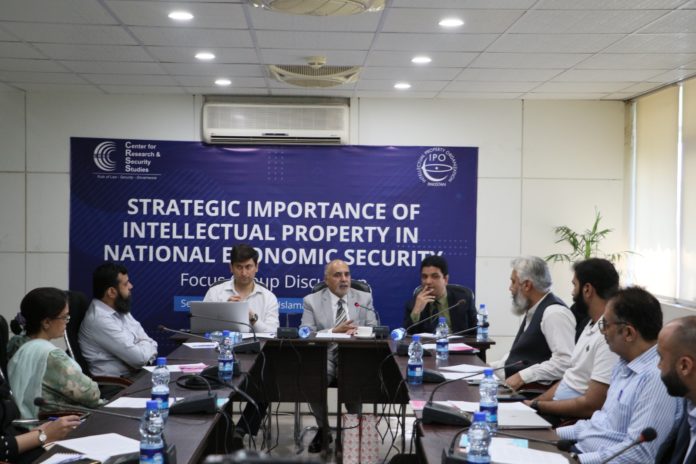Success comes from knowing one’s rights, a principle that resonates not only in the realm of human rights but also in the context of intellectual property (IP) rights – an essential area of knowledge for students, researchers, and the broader public in Pakistan, said the chairman of Intellectual Property Organization of Pakistan (IPO), Ambassador (R) Farukh Amil. He was speaking at the focus group discussion organized by the Center for Research and Security Studies (CRSS) in collaboration with IPO-Pakistan on “The Strategic Importance of Intellectual Property in National Economic Security”.
Elaborating on the goals IPO Pakistan, Ambassador (R) Farukh Amil noted that the organization is dedicated to increasing awareness of various aspects of intellectual property in Pakistan, including trademarks, patents, and copyrights. The knowledge of intellectual property is not only in the self-interest but also in the national interest which is paramount. However, he pointed out that the lack of awareness often results in the exploitation of unique creations and cultural resources and the vulnerability of the assets key to the nation’s economic security.
The Chairman underscored the importance of understanding IP rights through stark examples and disparities in IP awareness and protection. He noted that the estate of Michael Jackson continues to earn substantial revenue posthumously, while Laal Shahbaz Qalandar’s legacy does not due to insufficient IP protection. Lack of awareness around IP rights not only undermines creative sectors but also impacts national heritage and security. He emphasized that to foster a culture of IP awareness, these concepts must be integrated into the national curriculum, a discussion he has initiated with the Higher Education Commission and various universities. Lastly, he reiterated that Pakistan’s ability to attract foreign investment hinges on its adherence to key international treaties about the protection of intellectual property, and making the understanding and implementation of IP rights a critical priority for the country.
Mr. Ghulam Mujtaba, Deputy Director of Patents, IPO, explained that a patent is an exclusive right granted to inventors for tangible inventions, providing them with protection for a duration of 20 years. This right allows the inventor to control the production, sale, import, and export of their invention, effectively granting them monopoly rights as a reward for disclosing their innovation to the state. Mr. Mujtaba emphasized that this system encourages research and development (R&D) by preventing the unnecessary reinvention of existing technologies.
He highlighted the issue of reverse engineering in Pakistan where many industries invest considerable time in reverse engineering products, unaware that detailed technical information is readily available in patent databases, where exploring these resources could save years wasted in reinventing the wheel.
When questioned about the obstacles to utilizing these databases, Mr. Mujtaba responded that the limited resources dedicated to intellectual property (IP) hinder widespread outreach. Many researchers do not know what a patent is or how to access patent publications, leading to redundant efforts in their research. He mentioned that the IPO conducts numerous sessions annually to educate the public, often based on requests from institutions eager to learn more about patents and IP rights.
He further explained the conditions for patent eligibility including novelty, innovation, and industrial applicability. Unfortunately, he noted, many individuals seek patents for ideas already disclosed in the market, which only complicates the process. He lamented that while universities conduct applied research, there is often a disconnect between identifying a problem and developing a marketable solution, which could be patented.
Mr. Saifullah Khan, Deputy Director of Copyrights, IPO, noted that genuine businesses contribute significantly to the exchequer through tax payments, while smaller enterprises that engage in imitation harm the market by failing to provide authentic products. Historically, IP cases were handled in district courts, but the lack of specialized knowledge among judges often led to neglect of IP matters. In response, special IP courts have been established worldwide, including in Pakistan, to improve the adjudication of these cases.
In addressing the copyright registration process, Mr. Khan clarified that while registration is voluntary under the 1886 agreement (modified over the years), automatic protection is granted as soon as a work is expressed. This means individuals can claim protection without formalities, although the realities on the ground necessitate proof of the violation, which a copyright certificate provides. He highlighted the legal remedies available for violations, including civil actions for damages and criminal liabilities, which could entail imprisonment and fines.
Ms. Umme Salma, Deputy Director of Trademarks, IPO, provided an overview of trademarks, highlighting their critical role in distinguishing products and services. She defined a trademark as any word, symbol, logo, or slogan that can represent a product or service, explaining that trademarks protect unique identifiers.
Salma reassured that the IPO offers online facilities, making the process straightforward. The registration fee is nominal, and while the system is not multiclass yet, the forms are simple to complete. Salma pointed out that many people are unaware of the efficiency of the process.
The focus group discussion on intellectual property rights gathered a diverse array of experts and senior officials from academia, including university representatives and researchers, some of whom traveled from various cities to participate.
Courtesy: CRSS




